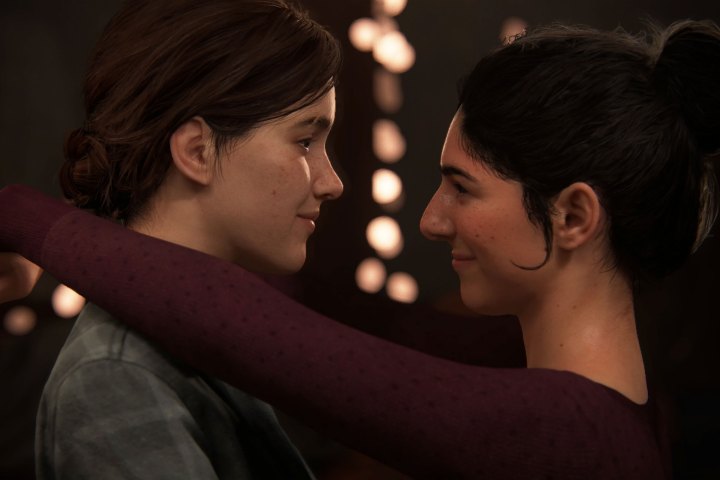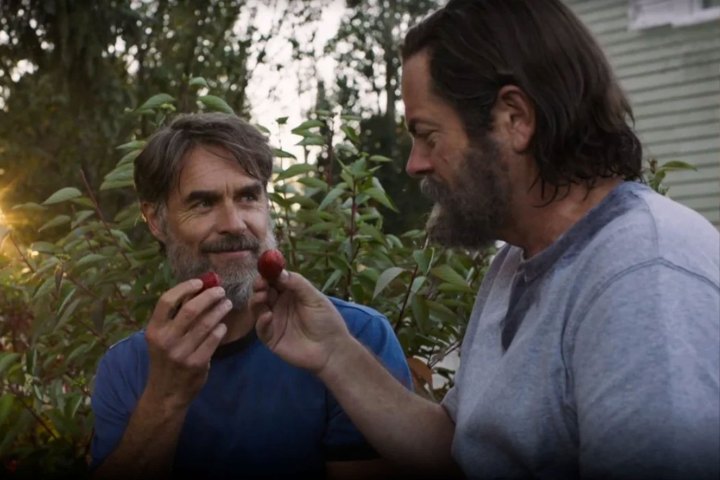Spoilers for The Last of Us Part I, The Last of Us Part II, and The Last of Us HBO show.
The Last of Us video games put queer stories front and center in the narrative, and the HBO adaptation of the same name is following their lead with its focus on a gay relationship in its third episode, Long, Long Time, which aired recently. While the relationship between Bill and Frank was certainly present in the 2013 zombie action game, it was relegated to the background as Joel and Ellie navigate the beginnings of their complicated relationship. In the show, however, we’re shown the couple’s 20-year relationship as they grow from hesitant strangers to lifelong partners.
Although Long, Long Time deviates pretty heavily from the source material of the game, it actually reinforces and strengthens one of the most important queer themes introduced in The Last of Us Part II. In the game, we’re shown over and over that when allowed to be themselves outside of the bounds of the bigoted systems of society, queer people are able to live their happiest, most honest lives.
Obviously, the idea of “happiness” in the world of The Last of Us is extremely relative since the ever-present zombie apocalypse affects everyone at some point or another regardless of sexual orientation or gender identity. But the albeit brief moments of joy and hope in The Last of Us Part II, and now the HBO adaptation, often come hand in hand with its queer character’s abilities to live confidently in their identities.
The LGBT+ stories of The Last of Us video games

In The Last of Us Part II, we see this theme play out again and again, with Ellie and Dina and their relationship with their queerness. Chronologically, one of the first things that happens in the game is that Ellie kisses Dina, another woman, during a town-wide party, but after sharing the touching moment, the pair are interrupted by homophobic slurs from one of the town’s residents.
When the pair finally leave town and venture out into the wilderness following the inciting incident in the story, Ellie and Dina are able to properly express their love for one another, unhindered by the bigotry of society. This comes around at the end of the game when the pair settle down in a house just outside the reach of town where they can raise their son happily and truly.
We see something similar happen with Lev, a trans man who leaves the hyper-religious conservative confines of the society he grew up in. Lev wasn’t accepted for being trans by his fellow Seraphites, so he and his sister, Yara, try and leave Seattle in search of someplace where he can live freely as the man he is. Outside the limits of bigoted manmade society, Lev is accepted by everyone he meets and finds happiness when he’s able to live openly as a man.
While things don’t always stay “happy” for the queer characters of The Last of Us Part II, the moments of love they experience, whether they’re romantic, familial, or platonic, are some of the most powerful in the series. In terms of what developer Naughty Dog is saying about bigotry and queerness, we can take away that the game studio wants players to understand that bigotry is a man-made concept that plagues society, while queerness is a natural part of the world. This concept isn’t novel or groundbreaking by any means, but it plays an important part in how The Last of Usas a whole portrays identity.
Long, Long Time and queer joy in the HBO show

The relationship between Bill and Frank echoes this theme. We never see the pair face any bigotry for their sexuality, but seeing how they were two fully grown gay men before the world ended in 2003, it’s safe to say that they experienced — or at the very least witnessed — discrimination against queer people at some point in their lives. Like in The Last of Us Part II, however, the bigotry that queer people face isn’t the focus of their characters; instead, their story focuses on the quiet, isolated love that they share outside the walls of larger society.
When given the chance to express their feelings on their own terms, Bill and Frank are able to get perhaps one of the happiest endings in the entire series. The pair get to grow old together and never live a single day apart even to the very end of their lives.
Long, Long Time is definitely a tearjerker, but that’s because of the bittersweetness of watching two people live happily and choose to end their lives after having grown old and content and not have its characters suffering some terrible fate. The reason they’re able to live so freely and happily is because of their queerness and their ability to be true to their feelings. Thanks to a global apocalypse that has collapsed all of the rules and behaviors (good and bad) of a “civilized” society, Bill and Frank are able to live naturally in their queerness outside the confines of unnatural bigotry.

It’s worth pointing out that there is no mandate for queer people, meaning that everyone will react differently to the themes and messages of queer narratives within the community. There are plenty of counter-interpretations that can be made about the queer stories of The Last of Us, but it’s widely agreed that queer narratives need to be told, and seeing them be focused on in large-budget productions like The Last of Us games, as well as the HBO series, is a good thing. It’s nice to see that HBO is doubling down on the themes of the source material while also adding its own stories to the mix with its adaptation.
The saga of Bill and Frank fits in perfectly next to the stories of Ellie, Dina, Lev, and Riley, the latter of which we’ll see later as the HBO series goes on. These are all queer stories that are touching in their own unique ways, but ultimately are bound together by one unifying theme: queerness is a part of the natural order of the world. Across all forms of it, whether as a video game or a TV show, The Last of Us shows time and time again that queer people and the stories they tell matter. Hopefully, Long, Long Time is just a taste of what’s to come.
Editors' Recommendations
- Kaitlyn Dever cast as Abby in The Last of Us season 2
- The Last of Us season 2 may fix The Last of Us Part II’s biggest flaw
- Why The Last of Us is better as a TV show than a video game
- 5 ways video game adaptations can learn from The Last of Us
- The Last of Us TV show will return for Season 2 at HBO


